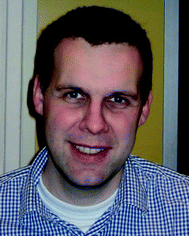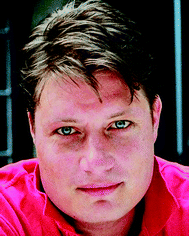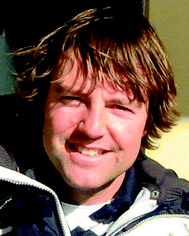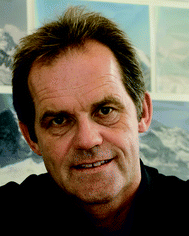DOI: 10.1039/C1LC90052H
(Profile)
Lab Chip, 2011, 11, 1993-1994
Contributors to the Netherlands issue
Wesley Browne
Wesley Browne completed his PhD (under Prof J. G. Vos) at Dublin City University in 2002, followed by postdoctoral positions first at Queen's University Belfast (with Prof. J. J. McGarvey) and then at the University of Groningen (with Prof. B. L. Feringa). In 2007 he was awarded a VIDI fellowship from the Netherlands Organization for Scientific Research and in 2008 was appointed to his present position as Assistant Professor at the University of Groningen. His research interests are diverse ranging from electrochemistry and Raman spectroscopy applied to both studying mechanisms in oxidation catalysis and to the photo/electrochemistry of molecular materials and polymers.José Manuel Gordillo
José Manuel Gordillo Arias de Saavedra obtained his PhD on hydrodynamic stability theory in Sevilla, Spain in December 2001. During a four month postdoctoral stay at Harvard University in 2002, he developed numerical codes to study potential flows with free surfaces. In 2004 he obtained a position as an assistant professor at the University of Sevilla where he still is teaching Fluid Mechanics and Aerodynamics. José Manuel Gordillo's present research subjects are hydrodynamic stability, low and high Reynolds number multiphase flow and microfluidics. He studies all these rich fluid mechanical phenomena doing experiments, numerical simulations and theory. José Manuel Gordillo is the director of the Fluid Mechanics Group (GIMFus) at the University of Sevilla.Jeanette Hussong
Jeanette Hussong graduated in Mechanical Engineering in 2006 at the Ruhr University of Bochum, Germany. She is currently finalizing her PhD study on artificial cilia induced microfluidic pumping at the Laboratory of Aero and Hydrodynamics of the Technical University Delft, The Netherlands. Her main interests are: Microfluidics and biomimetic fluid manipulation.Michiel Kreutzer
Michiel Kreutzer (1971, the Netherlands) received his PhD degree in Chemical Engineering from Delft University of Technology in December 2003. After a stint as visiting scientist at M.I.T. in the group of Klavs Jensen, he returned to Delft and joined the chemical engineering department as an assistant professor in 2006, where he was promoted to full professor in 2008. He currently holds the chair in Product and Process Engineering. His research interests are microscale transport phenomena, microfluidics, physics of bubbles and droplets, and chemical dynamics, with the aim of developing new experimental methods for discovery of chemistry and synthesis of materials.Detlef Lohse
Detlef Lohse obtained his PhD on the theory of turbulence in Marburg, Germany in 1992. As a postdoctorate in Chicago and later in Marburg and Muenchen he worked on single bubble sonoluminescence. In 1998 he was appointed Chair of Physics of Fluids at the University of Twente, The Netherlands, where he still is. Detlef Lohse's present research subjects are turbulence and multiphase flow, granular matter, and micro- and nanofluidics. Both experimental, theoretical, and numerical methods are used in his group. Detlef Lohse is Associate Editor of Journal of Fluid Mechanics and several other journals. He is Fellow of the American Physical Society (APS) and of IoP. He is also an elected Member of the German Academy of Science (Leopoldina) and the Royal Dutch Academy of Science (KNAW). He received the Spinoza Prize (2005), the Simon Stevin Prize (2009), and the Physica Prize (2011).Frieder Mugele
Frieder Mugele leads the Physics of Complex Fluids group in the MESA+ institute at the University of Twente since 2004. He is a physicist by training, obtained his PhD in 1997 at the University of Konstanz, Germany. His research interests include nanofluidics, microfluidic, and colloid physics. Wetting phenomena and their control by surface patterning and electrowetting have been a core activity throughout the last decade. Together with his then student J. C. Baret, Prof. Mugele is the author of the most widely cited review article on electrowetting.Patrick Onck
Patrick Onck (1968) received his PhD in applied mechanics (cum laude) in 1998 from Delft University of Technology. In 1998 and 1999 he was a postdoctoral researcher at Harvard University, USA. In 2001 he moved to the University of Groningen, where he is currently heading a theoretical/computational research group in applied physics. His research interests include cell biophysics and microfluidics. He studies fundamental biophysical process in membrane proteins, the cytoskeleton and cilia and flagella, powered by motor proteins. In microfluidics, his work includes the self-assembly of microfluidic channels and the propulsion and swimming of magnetically-actuated artificial cilia and flagella.Nicolas Schorr
Through his academic education in Scotland and Germany Nicolas Schorr earned a Master in Physics in Optoelectronic and Lasers as well as a Diploma degree in Nanotechnology. Currently he is working in the group of Prof. Jürgen Rühe at the Department of Microsystems Engineering of the University of Freiburg, Germany where he primarily specializes in the field of polymer micro-actuators.
Albert van den Berg
Albert van den Berg received his PhD at the University of Twente in 1988 on the topic of chemically modified ISFETs. From 1988–1993 he worked in Neuchatel, Switzerland, at the CSEM and the University on miniaturized chemical sensors. From 1993 until 1999 he was research director Micro Total Analysis Systems at the University of Twente. In 1998 he was appointed as part-time professor, and later in 2000 as full professor on Miniaturized Systems for (Bio)Chemical Analysis at the University of Twente. In 2002 he received the Simon Stevin Master award and in 2009 the Spinoza prize, the most prestigious Dutch scientific award. His current research interests focus on microanalysis systems and nanosensors, nanofluidics and single cells on chips. In 2010 he became honorary University Professor at the University of Twente.| This journal is © The Royal Society of Chemistry 2011 |








